五年级上册英语常用表达法
2019新人教pep版五年级上册英语 常用单词和常用表达法默写用纸

五年级上册:Unit 1:老的,年纪大的年轻的,岁数不大的滑稽的,可笑的体贴的,慈祥的,宽容的要求严格的,严厉的有礼貌的,客气的工作努力地,辛勤的有用的,愿意帮忙的聪明的聪颖的羞怯的,腼腆的,怕生的知道,了解我们的女士将要有时,间或机器人(用作宾语或表语)他会说,会讲,用(某种语言)说话完成,做好Unit 2:星期一星期二星期三星期四星期五星期六星期日周末洗洗我的衣服看看电视做,干做作业看,读看书踢,玩,参加(体育活动) 踢足球烹饪,烹调时常,常常公园疲倦的体育运动做体育运动(常用于纠正别人)应该,应当每一个,每个一天,一日工作计划,日程安排Unit 3:三明治蔬菜沙拉,混合沙拉汉堡包冰激凌茶,茶水新鲜的,刚摘的健康的美味的,可口的辣的,辛辣的含糖的,甜的喝,饮渴的,口渴的特别喜爱的食物(用于信函抬头的名字或头衔前)亲爱的洋葱,葱头Unit 4:唱,唱歌歌曲唱英文歌曲弹琵琶功夫,武术练武术跳舞画漫画画漫画烹调,烹饪游泳打篮球乒乓球说英语聚会,派对下一个的,紧接着的,接下来的极好的,了不起的学,学习,学会任何的,任一的问题没问题要,想要邮寄,发送电子邮件(后面接邮件地址)Unit 5:时钟,钟植物瓶子水瓶自行车,脚踏车照片,相片正面在……前面在……中间在(或向)……上面在旁边(附近)在(或向)……后面(表示存在或发生)祖父,祖母,外祖父,外祖母他们的,她们的,它们的房屋,房子,住宅大量,许多大量,许多花,花朵搬家肮脏的处处,到处老鼠住,居住自然界,大自然Unit 6:森林,林区河,江湖,湖泊高山,山岳小丘,小山树,树木,乔木桥建筑物,房子,楼房村庄,村镇房屋,房子,住宅划船去划船兔,野兔高的Unit 1:他年轻吗?不,他不年轻。
她什么样?她很和蔼。
Unit2:星期四你有什么课?我有数学、英语和音乐课。
你经常在这个公园里看书吗?不,我不经常在这里看书。
Unit3:你想吃什么?请给我一个三明治。
你想喝什么?我想喝点水。
五年级上册常用表达法
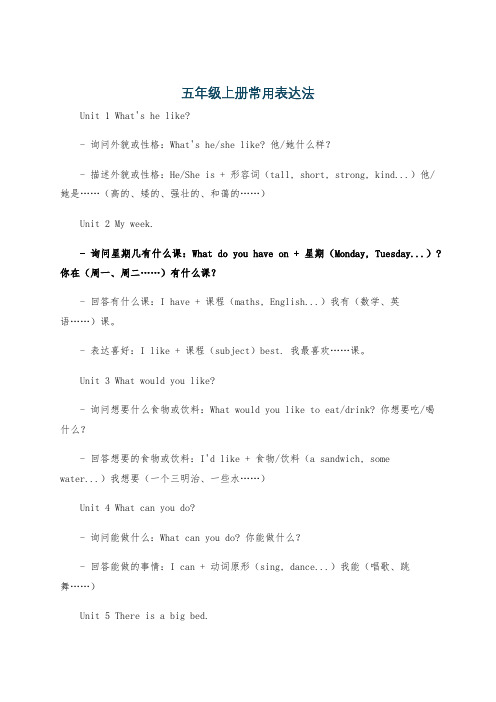
五年级上册常用表达法Unit 1 What's he like?- 询问外貌或性格:What's he/she like? 他/她什么样?- 描述外貌或性格:He/She is + 形容词(tall, short, strong, kind...)他/她是……(高的、矮的、强壮的、和蔼的……)Unit 2 My week.- 询问星期几有什么课:What do you have on + 星期(Monday, Tuesday...)? 你在(周一、周二……)有什么课?- 回答有什么课:I have + 课程(maths, English...)我有(数学、英语……)课。
- 表达喜好:I like + 课程(subject)best. 我最喜欢……课。
Unit 3 What would you like?- 询问想要什么食物或饮料:What would you like to eat/drink? 你想要吃/喝什么?- 回答想要的食物或饮料:I'd like + 食物/饮料(a sandwich, some water...)我想要(一个三明治、一些水……)Unit 4 What can you do?- 询问能做什么:What can you do? 你能做什么?- 回答能做的事情:I can + 动词原形(sing, dance...)我能(唱歌、跳舞……)Unit 5 There is a big bed.- 描述某处有某物:There is + 单数名词(a desk, a book...)+ 地点(in the room, on the table...)在……(房间里、桌子上……)有一个……(书桌、书……)- 描述某处有某些物:There are + 复数名词(some books, some pens...)+ 地点(in the bag, on the floor...)在……(包里、地板上……)有一些……(书、钢笔……)Unit 6 In a nature park.- 描述自然公园里有什么:There is/are + 事物(a forest, some mountains...)in the nature park. 在自然公园里有(一片森林、一些山……)。
五年级上册英语单词表,常用句子表达法
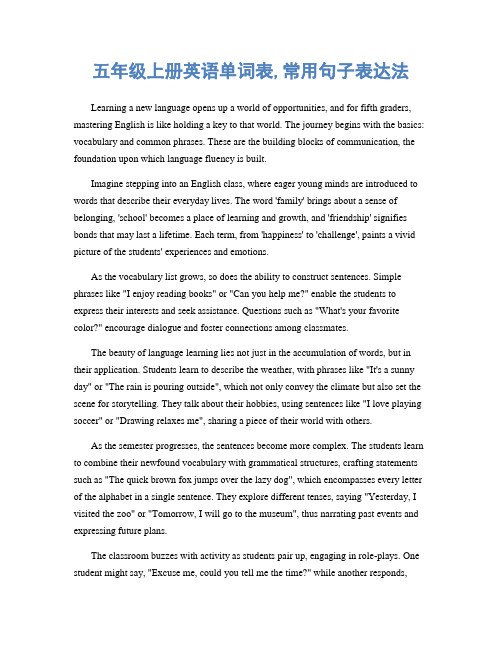
五年级上册英语单词表,常用句子表达法Learning a new language opens up a world of opportunities, and for fifth graders, mastering English is like holding a key to that world. The journey begins with the basics: vocabulary and common phrases. These are the building blocks of communication, the foundation upon which language fluency is built.Imagine stepping into an English class, where eager young minds are introduced to words that describe their everyday lives. The word 'family' brings about a sense of belonging, 'school' becomes a place of learning and growth, and 'friendship' signifies bonds that may last a lifetime. Each term, from 'happiness' to 'challenge', paints a vivid picture of the students' experiences and emotions.As the vocabulary list grows, so does the ability to construct sentences. Simple phrases like "I enjoy reading books" or "Can you help me?" enable the students to express their interests and seek assistance. Questions such as "What's your favorite color?" encourage dialogue and foster connections among classmates.The beauty of language learning lies not just in the accumulation of words, but in their application. Students learn to describe the weather, with phrases like "It's a sunny day" or "The rain is pouring outside", which not only convey the climate but also set the scene for storytelling. They talk about their hobbies, using sentences like "I love playing soccer" or "Drawing relaxes me", sharing a piece of their world with others.As the semester progresses, the sentences become more complex. The students learn to combine their newfound vocabulary with grammatical structures, crafting statements such as "The quick brown fox jumps over the lazy dog", which encompasses every letter of the alphabet in a single sentence. They explore different tenses, saying "Yesterday, I visited the zoo" or "Tomorrow, I will go to the museum", thus narrating past events and expressing future plans.The classroom buzzes with activity as students pair up, engaging in role-plays. One student might say, "Excuse me, could you tell me the time?" while another responds,"Sure, it's half past two". These interactions are not just exercises; they are rehearsals for real-life situations where English serves as a tool for communication.Incorporating these elements into daily lessons, the teacher ensures that each student understands the importance of context. Phrases like "Please pass the salt" at the dinner table or "I'm sorry for being late" in an apology are not just words; they are expressions of courtesy and respect.By the end of the term, the students have a rich tapestry of words and sentences at their disposal. They can describe their feelings, ask for directions, make purchases, and even tell jokes. The language that once seemed foreign is now a part of their identity, a means to connect with the world beyond their classroom walls.In essence, the journey through the fifth-grade English syllabus is more than just memorizing lists and practicing pronunciation. It's about discovering the power of words to express thoughts, convey emotions, and build bridges across cultures. It's about transforming a classroom into a gateway, through which young learners can explore the vast and vibrant world of English communication. And as these students continue to learn and grow, they carry with them the lessons of language that will serve them for years to come. 。
英语五年级上册常用表达法

英语五年级上册常用表达法English: Good morning, everyone! My name is Sarah. Nice to meet you all.Chinese: 大家早上好!我是萨拉。
很高兴认识你们。
II. Expressing FeelingsEnglish: I feel so happy today because it's my birthday. I'm thrilled to have you all here celebrating with me.Chinese: 今天我感到非常开心,因为是我的生日。
我很激动有你们所有人在这里与我一起庆祝。
III. Describing Objects and PlacesEnglish: Our classroom is bright and spacious. There's a big whiteboard at the front, rows of desks and chairs, and a colorful world map on the wall.Chinese: 我们的教室明亮且宽敞。
前面有一块大白板,一排排的桌椅,墙上挂着一幅色彩斑斓的世界地图。
IV. Asking for HelpEnglish: Excuse me, could you please help me carry this heavy box? I'm having trouble lifting it by myself.Chinese: 不好意思,请问你能帮我搬一下这个重箱子吗?我自己一个人很难抬起来。
V. Giving DirectionsEnglish: To get to the library, turn left at the school gate, walk straight until you see the red building with a clock tower, and it's right there on your right.Chinese: 去图书馆的话,学校门口向左转,直走直到看到有钟楼的红色建筑,它就在你的右手边。
五年级上册英语公式人教版的
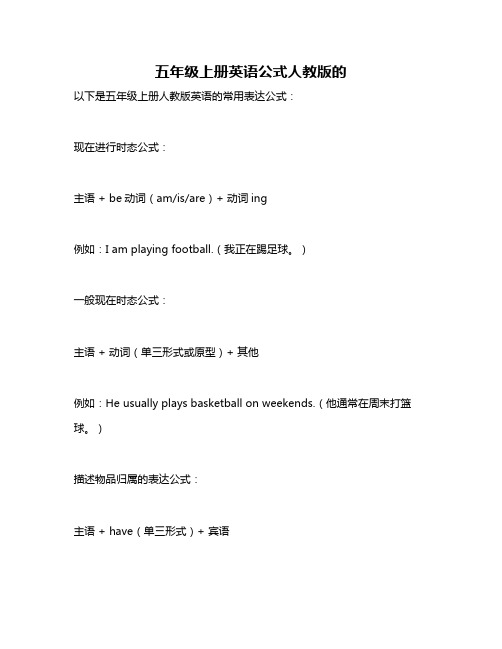
五年级上册英语公式人教版的
以下是五年级上册人教版英语的常用表达公式:
现在进行时态公式:
主语 + be动词(am/is/are)+ 动词ing
例如:I am playing football.(我正在踢足球。
)
一般现在时态公式:
主语 + 动词(单三形式或原型)+ 其他
例如:He usually plays basketball on weekends.(他通常在周末打篮球。
)
描述物品归属的表达公式:
主语 + have(单三形式)+ 宾语
例如:She has a beautiful skirt.(她有一条漂亮的裙子。
)
描述位置的表达公式:
主语 + be动词(am/is/are)+ 介词短语
例如:The book is on the table.(书在桌子上。
)
描述喜好的表达公式:
主语 + like/likes + 宾语
例如:I like watching TV.(我喜欢看电视。
)
这些是五年级上册人教版英语的基本公式。
当然,英语语法和表达方式非常丰富,这只是其中的一部分。
不过,这些公式可以帮助学生更好地理解和运用基本的英语表达方式。
新人教版五年级英语上册单词表
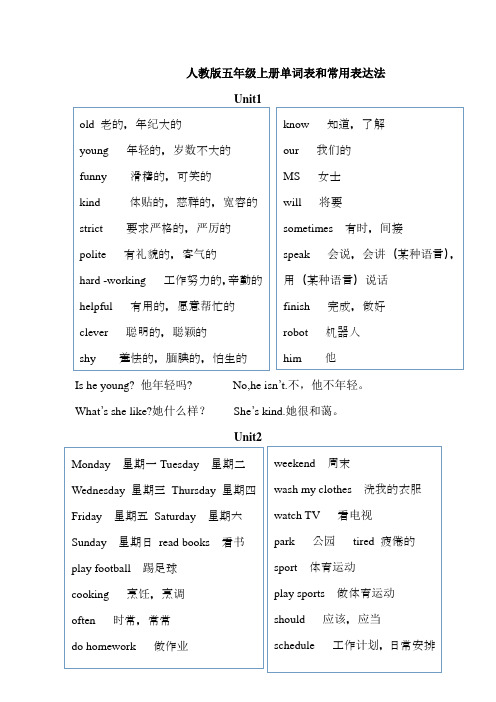
人教版五年级上册单词表和常用表达法Unit1Is he young? 他年轻吗? No,he isn ’t.不,他不年轻。
What ’s she like?她什么样? She ’s kind.她很和蔼。
Unit2old 老的,年纪大的young 年轻的,岁数不大的 funny 滑稽的,可笑的 kind 体贴的,慈祥的,宽容的 strict 要求严格的,严厉的 polite 有礼貌的,客气的 hard -working 工作努力的,辛勤的 helpful 有用的,愿意帮忙的 clever 聪明的,聪颖的 shy 羞怯的,腼腆的,怕生的know 知道,了解 our 我们的 MS 女士 will 将要sometimes 有时,间接speak 会说,会讲(某种语言),用(某种语言)说话 finish 完成,做好 robot 机器人 him 他Monday 星期一Tuesday 星期二 Wednesday 星期三 Thursday 星期四 Friday 星期五 Saturday 星期六 Sunday 星期日 read books 看书 play football 踢足球 cooking 烹饪,烹调 often 时常,常常 do homework 做作业weekend 周末wash my clothes 洗我的衣服 watch TV 看电视 park 公园 tired 疲倦的 sport 体育运动 play sports 做体育运动 should 应该,应当schedule 工作计划,日常安排What do you have on Thursday?星期四你有什么课? I have maths,English and music.我有数学,英语和音乐课。
Do you often read books in this park?你经常在这个公园里看书吗? No,I don ’t.不,我不经常在这里看书。
Unit3What would you like to eat? 你想吃什么? A sandwich ,please. 请给我一个三明治。
常用表达(知识清单)-2023-2024学年人教PEP版英语5-6年级
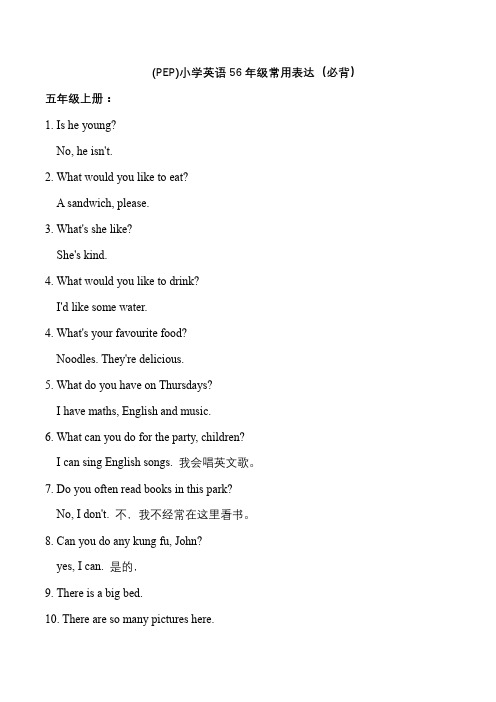
(PEP)小学英语56年级常用表达(必背)五年级上册:1. Is he young?No, he isn't.2. What would you like to eat?A sandwich, please.3. What's she like?She's kind.4. What would you like to drink?I'd like some water.4. What's your favourite food?Noodles. They're delicious.5. What do you have on Thursdays?I have maths, English and music.6. What can you do for the party, children?I can sing English songs. 我会唱英文歌。
7. Do you often read books in this park?No, I don't. 不,我不经常在这里看书。
8. Can you do any kung fu, John?yes, I can. 是的,9. There is a big bed.10. There are so many pictures here.11. Is there a river in the forest, Miss White?No, there isn't.12. Are there any tall buildings in the nature park?No, there aren't.五年级下册:1.When do you finish class in the morning?We finish class at 1 o’clock.2.What do you do on the weekend?I often watch TV and play pingpong with my father.3.–Which season do you like best, Mike??winter.4.–Why?Because I like summer vacation.5.When is the party?It’s in April.6.When is the trip this year?It’s in October. We’ll go to the Great Wall.7.When is the art show?It’s on May 1st.8.When is your birthday?It’s on April 4th.9.The yellow picture is mine.10.Are these all ours?11.–Whose is it?It’s Zhang Peng’s.12.Is he drinking water?No, he isn’t. He’s eating.13.What are they doing?They are eating lunch.14.What is the little monkey doing?It’s playing with its mother.15.Shhh, talk quietly.16.Keep your desk clean.六年级上册:17.Where is the museum shop?It's near the door.18.How can we get there?Turn left at the bookstore.19.How do you e to school?Usually, I e on foot.20.In the USA people on bikes must wear one.21.Don't go at the red light!22.I must pay attention to the traffic lights.23.What are you going to do tomorrow?I'm going to have an art lesson.24.We're going to draw some pictures in Renmin Park. 我25.Where are you going?We're going to the cinema.26.When are you going?27.What are Peter's hobbies?He likes reading stories.28.Does he live in Sydney?No, he doesn't.29.Does he like doing word puzzles and going hiking?Yes, he does. 是的,30.What does he do?He's a businessman.31.Where does he work?He works at sea.32.How does he go to work?He goes to work by bike.33.They're afraid of him.34.The cat is angry with them.35.What's wrong?Your father is ill.36.He should see a doctor this morning.37.Don't be sad.六年级下册:38.It was good, thank you.39.That's the tallest dinosaur in this hall.40.It's taller than both of us together.41.How tall are you?I'm 1.65 metres.42.What size are your shoes, Mike?Your feet are bigger than mine. My shoes are size 37.43.How heavy are you?I'm 48 kilograms.44.How was your weekend?It was good. Thank you.45.What did you do?I stayed at home with your grandma. We drank tea in the afternoon and watchedTV.46.Did you do anything else?Yes, I cleaned my room and washed my clothes.47.I want to buy the new film magazine.48.What did you do last weekend? Did you see a film?No, I had a cold. I stayed at home all weekend and slept.49.What happened?50.Are you all right?I'm OK now.51.Where did you go?52.It looks like a mule!53.Did you go to Turpan?Yes, we did.54.How did you go there?We went there by plane.55.There was no library in my old school.56.Tell us about your school, please.57.How do you know that?58.There were no puters or Internet in my time.59.Before, I was quiet. Now, I'm very active in class.60.Sounds great!61.I was short, so I couldn't ride my bike well. Now. I go cycling every day.。
五年级上册常用单词和常用表达法默写用纸

五年级上册:Unit 1:老的,年纪大的年轻的,岁数不大的滑稽的,可笑的体贴的,慈祥的,宽容的要求严格的,严厉的有礼貌的,客气的工作努力地,辛勤的有用的,愿意帮忙的聪明的聪颖的羞怯的,腼腆的,怕生的知道,了解我们的女士将要有时,间或机器人(用作宾语或表语)他会说,会讲,用(某种语言)说话完成,做好Unit 2:星期一星期二星期三星期四星期五星期六星期日周末洗洗我的衣服看看电视做,干做作业看,读看书踢,玩,参加(体育活动) 踢足球烹饪,烹调时常,常常公园疲倦的体育运动做体育运动(常用于纠正别人)应该,应当每一个,每个一天,一日工作计划,日程安排Unit 3:三明治蔬菜沙拉,混合沙拉汉堡包冰激凌茶,茶水新鲜的,刚摘的健康的美味的,可口的辣的,辛辣的含糖的,甜的喝,饮渴的,口渴的特别喜爱的食物(用于信函抬头的名字或头衔前)亲爱的洋葱,葱头Unit 4:唱,唱歌歌曲唱英文歌曲弹琵琶功夫,武术练武术跳舞画漫画画漫画烹调,烹饪游泳打篮球乒乓球说英语聚会,派对下一个的,紧接着的,接下来的极好的,了不起的学,学习,学会任何的,任一的问题没问题要,想要邮寄,发送电子邮件(后面接邮件地址)Unit 5:时钟,钟植物瓶子水瓶自行车,脚踏车照片,相片正面在……前面在……中间在(或向)……上面在旁边(附近)在(或向)……后面(表示存在或发生)祖父,祖母,外祖父,外祖母他们的,她们的,它们的房屋,房子,住宅大量,许多大量,许多花,花朵搬家肮脏的处处,到处老鼠住,居住自然界,大自然Unit 6:森林,林区河,江湖,湖泊高山,山岳小丘,小山树,树木,乔木桥建筑物,房子,楼房村庄,村镇房屋,房子,住宅划船去划船兔,野兔高的Unit 1:他年轻吗?不,他不年轻。
她什么样?她很和蔼。
Unit2:星期四你有什么课?我有数学、英语和音乐课。
你经常在这个公园里看书吗?不,我不经常在这里看书。
Unit3:你想吃什么?请给我一个三明治。
你想喝什么?我想喝点水。
【免费】小学英语五年级上册常用口语交流表达法

小学英语五年级上册常用口语交流表达法Unit1他年轻吗?不,他不年轻。
Is he young? No, he isn’t.她什么样?她很和蔼。
What’s she like? She’s kind.Unit2星期四你上什么课?我数学、英语和音乐。
What do you have on Thursdays? I have maths, English and music. 你经常在这个公园里看书吗?不,我不经常在这里看书。
Do you often read books in this park? No, I don’t.Unit3你想吃什么?请给我两个三明治。
What would you like to eat? Two sandwiches ,please.你想喝什么?我想喝点水。
What would you like to drink? I’d like some water.你最喜欢的食物是什么?面条。
面条很好吃。
What’s your favourite food? Noodles. They’re delicious.Unit4孩子们,你们能为联欢会做什么?我会唱英文歌。
What can you do for the party, children? I can sing English songs.约翰,你会武术吗?是的,我会。
Can you do any kung fu, John? Yes, I can .Unit5有张大床There is a big bed.这里有这么多幅画。
There are so many pictures here.Unit6怀特小姐,森林里有河吗? 不,没有河。
Is there a river in the forest, Miss White? No, there isn’t.自然公园里有高楼吗?不,没有.Are there any tall buildings in the nature park? No, there aren’t.小学英语不仅要求训练每个学生的听说能力,而且要求在口语交流中规范口头语言,培养语言交际能力。
五年级上册英语常用表达法表

五年级上册英语常用表达法表**English Content:**As students progress through their academic journey, mastering the fundamental English expressions becomes crucial, especially in the fifth grade. The fifth-grade English textbook is rich in vocabulary and sentence structures that lay a solid foundation for further language learning. In this article, we will delve into the commonly used expressions in the fifth-grade English textbook and explore their applications in real-life scenarios.**Greetings and Introductions:*** Hi, I'm [name]. * Hello, [name]. Nice to meet you. * How do you do?These expressions are essential for initiating conversations and introducing oneself. They are used in school, social gatherings, and other social settings to establish a connection with others.**Expressing Feelings and Emotions:*** I'm happy/sad/angry/excited. * I feel [emotion] about [topic/event].Learning to express one's feelings and emotions is crucial for emotional intelligence. These expressions help students communicate their inner states, which is essential for emotional well-being and social interaction.**Asking for and Giving Information:*** What's your name? * How old are you? * Where are you from? * I'm from [place]. * I'm [age] years old.These expressions are fundamental for acquiring and sharing basic information about oneself and others. They foster communication skills and encourage students to engage in meaningful conversations.**Describing Things and Events:*** It's [color] and [shape]. * It's big/small/tall/short. * I like [activity] because it's [reason].Describing things and events helps students developtheir observational skills and enhances their ability to communicate their observations effectively. Theseexpressions are often used in class discussions, storytelling, and descriptive writing.**Expressing Preferences and Choices:*** I like [food/activity/subject]. * My favorite[food/activity/subject] is [item]. * I prefer [option A] to [option B].Expressing preferences and choices is a crucial skill in making decisions and understanding individual tastes. These expressions are used in daily life, from choosing what to eat for lunch to deciding on extracurricular activities.**Asking for and Giving Directions:*** Where is the [place]? * Can you show me how to get to [place]? * Go straight/turn left/turn right.Navigating through spaces and finding one's way is an essential life skill. These expressions help studentsorient themselves in familiar and unfamiliar environments, fostering independence and confidence.**Requesting and Offering Help:*** Can you help me with [task]? * Sure, I can help you. * Thank you for helping me.Learning to ask for and offer help is fundamental for building a supportive and collaborative learning environment. These expressions foster teamwork, empathy, and a sense of community.**Apologizing and Responding to Apologies:*** I'm sorry. * It's okay. * Thank you for apologizing. Apologizing and responding to apologies are essential social skills that promote conflict resolution and foster positive relationships. These expressions teach students to take responsibility for their actions and show empathy towards others.**Concluding Remarks:**The fifth-grade English textbook is a rich repository of expressions that lay the foundation for lifelong language learning. By mastering these expressions and applying them in real-life scenarios, students can enhance their communication skills, emotional intelligence, and social awareness. Encouraging students to practice theseexpressions regularly will help them build confidence and fluency in the English language.**中文内容:****五年级上册英语常用表达法表详解与运用**随着学生学术旅程的推进,掌握基础英语表达变得至关重要,特别是在五年级。
(word完整版)新人教版五年级英语上册单词表.doc
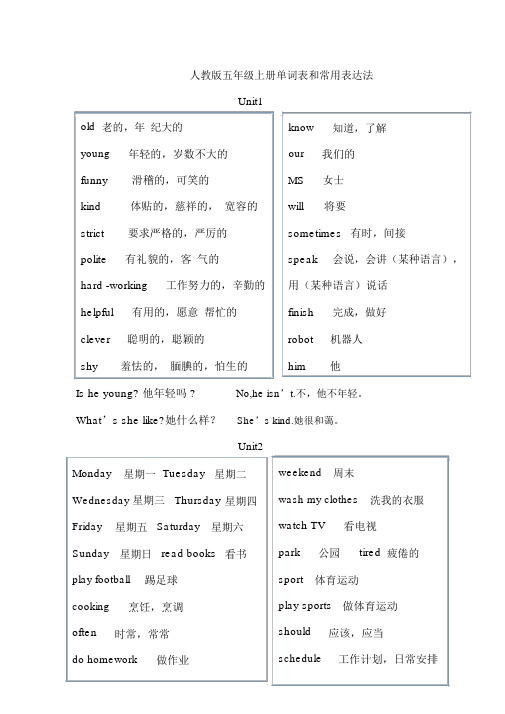
人教版五年级上册单词表和常用表达法Unit1old 老的,年纪大的know 知道,了解young 年轻的,岁数不大的our 我们的funny滑稽的,可笑的MS女士kind体贴的,慈祥的,宽容的will将要strict要求严格的,严厉的sometimes有时,间接polite有礼貌的,客气的speak会说,会讲(某种语言),hard -working工作努力的,辛勤的用(某种语言)说话helpful有用的,愿意帮忙的finish完成,做好clever聪明的,聪颖的robot机器人shy羞怯的,腼腆的,怕生的him他Is he young? 他年轻吗 ?No,he isn’t.不,他不年轻。
What’s she like?她什么样?She’s kind.她很和蔼。
Unit2Monday 星期一Tuesday 星期二weekend 周末Wednesday 星期三Thursday 星期四wash my clothes 洗我的衣服Friday 星期五Saturday 星期六watch TV 看电视Sunday 星期日read books 看书park 公园tired 疲倦的play football 踢足球sport 体育运动cooking 烹饪,烹调play sports 做体育运动often 时常,常常should 应该,应当do homework 做作业schedule 工作计划,日常安排What do you have on Thursday?星期四你有什么课?I have maths,English and music我.有数学,英语和音乐课。
Do you often read books in this park?你经常在这个公园里看书吗?No,I don’t.不,我不经常在这里看书。
Unit3sandwich三明治salad蔬菜沙拉,水鬼沙拉hamburger汉堡包ice cream冰激凌tea茶,茶水fresh新鲜的,刚摘得healthy健康的delicious美味的,可口的favourite特别喜爱的food食物Dear亲爱的(用于信函抬头的名字或头衔前)onion洋葱,葱头hot辣的,辛辣的sweet含糖的,甜的drink喝,饮thirsty渴的,口渴的What would you like to eat?你想吃什么?A sandwich,please.请给我一个三明治。
英语五年级上册第四单元,常用表达法

第一部分:Introduction1.1 单元内容概述英语五年级上册第四单元主要内容为常用表达法,包括日常用语、表达时间、描述天气等内容。
通过学习这些常用表达法,学生可以更流利地进行日常交流。
1.2 学习目标通过本单元的学习,学生应该能够掌握一些常用的英语表达方式,能够在日常生活中流利地表达自己的想法和需求。
第二部分:日常用语2.1 问候语在日常交流中,问候语是非常重要的。
学生需要掌握一些基本的问候语,如“Hello”、“Good morning”、“Good afternoon”等。
2.2 紧急求助当遇到紧急情况时,学生也需要学会一些求助的表达方式,如“Help me, please”、“Call the police”等。
第三部分:表达时间3.1 询问时间学生需要学会如何询问时间,比如“Excuse me, what time is it?”。
3.2 表达时间学生也需要掌握如何表达时间,包括数字的读法以及时间的描述方式,如“It’s two o’clock”、“It’s half past three”等。
第四部分:描述天气4.1 天气状况学生需要学会描述不同的天气状况,包括晴天、阴天、下雨、下雪等,如“It’s sunny today”、“It’s r本人ning heavily”。
4.2 气温表达学生还需要学会如何表达气温,如“It’s 20 degrees Celsius”、“It’s very cold today”。
第五部分:综合练习5.1 口语练习为了帮助学生更好地掌握常用表达法,老师可以设计一些口语练习,让学生在实际情境中进行练习,比如模拟问路、讨价还价等场景。
5.2 书面练习老师也可以布置一些书面练习,让学生在书面表达方面得到锻炼,比如写一篇关于自己日常生活的短文,或者描述一个天气变化的情景等。
第六部分:教学方法6.1 多媒体教学在教学过程中,教师可以通过多媒体方式呈现一些真实场景,让学生在视听的同时学习常用表达法。
(完整版)新人教版五年级英语上册单词表

人教版五年级上册单词表和常用表达法Unit1Is he young? 他年轻吗? No,he isn ’t.不,他不年轻。
What ’s she like?她什么样? She ’s kind.她很和蔼。
Unit2old 老的,年纪大的young 年轻的,岁数不大的 funny 滑稽的,可笑的 kind 体贴的,慈祥的,宽容的 strict 要求严格的,严厉的 polite 有礼貌的,客气的 hard -working 工作努力的,辛勤的 helpful 有用的,愿意帮忙的 clever 聪明的,聪颖的 shy 羞怯的,腼腆的,怕生的know 知道,了解 our 我们的 MS 女士 will 将要sometimes 有时,间接speak 会说,会讲(某种语言),用(某种语言)说话 finish 完成,做好 robot 机器人 him 他Monday 星期一Tuesday 星期二 Wednesday 星期三 Thursday 星期四 Friday 星期五 Saturday 星期六 Sunday 星期日 read books 看书 play football 踢足球 cooking 烹饪,烹调 often 时常,常常 do homework 做作业weekend 周末wash my clothes 洗我的衣服 watch TV 看电视 park 公园 tired 疲倦的 sport 体育运动 play sports 做体育运动 should 应该,应当schedule 工作计划,日常安排What do you have on Thursday?星期四你有什么课? I have maths,English and music.我有数学,英语和音乐课。
Do you often read books in this park?你经常在这个公园里看书吗? No,I don ’t.不,我不经常在这里看书。
Unit3What would you like to eat? 你想吃什么? A sandwich ,please. 请给我一个三明治。
人教版五年级英语上册句型讲解

人教版五年级英语上册句型讲解人教版五年级英语上册句型讲解:
1. What's your name?
这是一个常见的问候句型,用来询问对方的名字。
2. How old are you?
这是一个询问年龄的句型。
用来询问对方的年龄。
3. Where are you from?
这是一个询问来自哪里的句型。
用来询问对方的籍贯。
4. What's your favorite color?
这是一个询问对方喜欢的颜色的句型。
5. Can you swim?
这是一个询问对方是否会游泳的句型。
6. How do you go to school?
这是一个询问上学的方式的句型。
7. What do you like doing in your free time?
这是一个询问对方在空闲时间喜欢做什么的句型。
8. What's the weather like today?
这是一个询问今天天气如何的句型。
9. What time do you get up?
这是一个询问对方起床时间的句型。
10. How was your weekend?
这是一个询问对方周末过得怎样的句型。
以上是人教版五年级英语上册中常见的一些句型,希望能对您有所帮助。
五年级上册常用表达法和单词
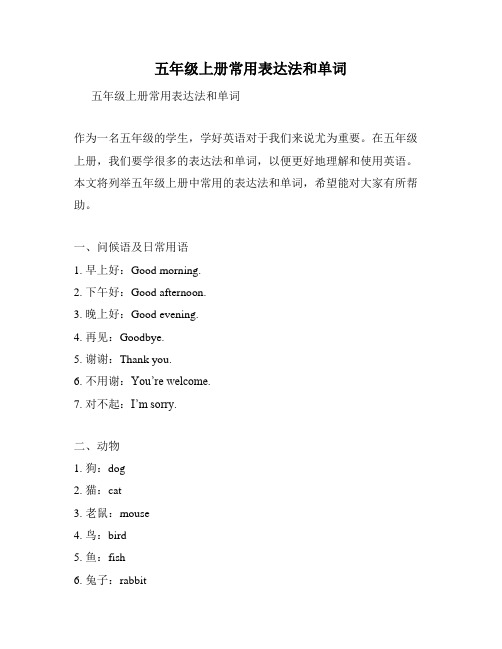
五年级上册常用表达法和单词五年级上册常用表达法和单词作为一名五年级的学生,学好英语对于我们来说尤为重要。
在五年级上册,我们要学很多的表达法和单词,以便更好地理解和使用英语。
本文将列举五年级上册中常用的表达法和单词,希望能对大家有所帮助。
一、问候语及日常用语1. 早上好:Good morning.2. 下午好:Good afternoon.3. 晚上好:Good evening.4. 再见:Goodbye.5. 谢谢:Thank you.6. 不用谢:You’re welcome.7. 对不起:I’m sorry.二、动物1. 狗:dog2. 猫:cat3. 老鼠:mouse4. 鸟:bird5. 鱼:fish6. 兔子:rabbit7. 马:horse8. 猪:pig9. 牛:cow10. 羊:sheep11. 鸡:chicken三、水果及食品1. 苹果:apple2. 香蕉:banana3. 葡萄:grape4. 橘子:orange5. 草莓:strawberry6. 西瓜:watermelon7. 米饭:rice8. 面包:bread9. 面条:noodles10. 汉堡:hamburger11. 披萨:pizza四、数字1. 一:one2. 二:two3. 三:three4. 四:four5. 五:five6. 六:six7. 七:seven8. 八:eight9. 九:nine10. 十:ten五、天气及时间1. 晴朗的天气:sunny weather2. 下雨的天气:rainy weather3. 下雪的天气:snowy weather4. 温度:temperature5. 昨天:yesterday6. 今天:today7. 明天:tomorrow8. 上午:morning9. 下午:afternoon10. 晚上:evening以上就是五年级上册常用的表达法和单词,掌握了这些内容,相信能够让我们更好地学习英语。
五年级上册英语常用表达法人教版

五年级上册英语常⽤表达法⼈教版1. ⼩学五年级英语常⽤语法• 初中英语语法⼝诀歌 1.数词变化规律及读法⼝诀两⼤数词基和序,前表数量后第⼏。
构成先谈基数词,1⾄12请认真记。
13⾄19teen结尾齐,ty结尾表⽰⼏⼗。
若要表达⼏⼗⼏,⼏⼗短横1到9。
One hundred ⼀百记,若表⼏百⼏⼗⼏。
⼏百 and⼏⼗⼏,基数规律上述⾥。
再把序数谈仔细,第⼀⾄三独⽴记。
第四⾄⼗九结尾th,第廿到九⼗有规律。
基数基础y变ieth。
第⼏⼗⼏有特例,第⼏⼗由基数起,⼏⽤序数有道理。
第⼀百one hundred。
若说第⼀百⼏⼗⼏。
One hundred and第⼏⼗⼏。
谈此即告⼀段落。
序有缩式莫忘记,上述须⽤⼼体味。
2.句⼦种类⼝诀句⼦按⽤途分四⼤体,陈述疑问感叹和祈使。
陈述⽤来叙述⼀件事。
疑问主要⽤来提问题。
祈使表达命令和请求。
表达强烈感情感叹句。
上述九是句种之定义。
祈使主语you被抛弃。
若将其变成否定形式,动词之前加don't是正理。
3.陈述句变感叹句⼝诀英语陈述变感叹两句套。
What 或How加其他成分表。
What [a(an)]形加名⽤的妙。
剩余照写句末⽤感叹号。
How 后副和形是正确道,其后照写感叹号堪称妙。
4.⼀般现在时⽤法及句型转换⼝诀经常习惯动作和真理,是⼀般现在时的定义。
构成除单三皆动原式。
若逢动词第三⼈称体,动词变单三式有道理。
若要变成否定的形式,动词原形之前加don't,除单三⼈称外⽆特例。
单三式前doesn't动原基。
句⾸Do,Does疑问起,Does⽤单三⼈称限制,单三还原形没⼤问题。
5.变动词单三⼈称⼝诀⼀般情况动词尾-s加。
O,s,ch,sh结尾“-es”没有差。
辅⾳加y 去y为“-ies”是⽅法。
6.现在进⾏时及句型转换⼝诀现在正在进⾏之动作,⽤现在进⾏时来掌舵。
构成be加现在分词妥,be的⽤法如同系动词。
切记be是助动词没错,be后⾯加not否定拓。
五年级上册英语常用表达法表
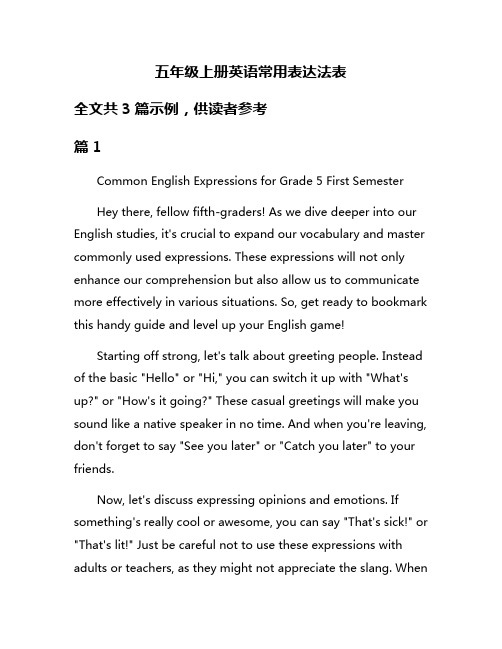
五年级上册英语常用表达法表全文共3篇示例,供读者参考篇1Common English Expressions for Grade 5 First SemesterHey there, fellow fifth-graders! As we dive deeper into our English studies, it's crucial to expand our vocabulary and master commonly used expressions. These expressions will not only enhance our comprehension but also allow us to communicate more effectively in various situations. So, get ready to bookmark this handy guide and level up your English game!Starting off strong, let's talk about greeting people. Instead of the basic "Hello" or "Hi," you can switch it up with "What's up?" or "How's it going?" These casual greetings will make you sound like a native speaker in no time. And when you're leaving, don't forget to say "See you later" or "Catch you later" to your friends.Now, let's discuss expressing opinions and emotions. If something's really cool or awesome, you can say "That's sick!" or "That's lit!" Just be careful not to use these expressions with adults or teachers, as they might not appreciate the slang. Whenyou're excited about something, you can exclaim "I'm stoked!" or "I can't wait!" And if you're feeling down, you can share "I'm bummed" or "I'm feeling blue."Moving on to making requests, instead of simply saying "Can I...?" or "May I...?" you can try "Is it cool if I...?" or "Do you mind if I...?" These phrases sound more polite and casual at the same time. And when you need to ask for repetition or clarification, you can use "Say that again?" or "Come again?"Don't forget about expressing agreement and disagreement. Instead of just saying "Yes" or "No," you can mix it up with "You bet!" or "Absolutely!" for agreement, and "I don't think so" or "I beg to differ" for disagreement. These expressions will make your conversations more engaging and natural.Now, let's talk about describing things and situations. If something is really good, you can say "It's the bomb!" or "It's the bee's knees!" And if something is confusing or difficult, you can express "It's a brain scrambler" or "It's a mind-boggler." These expressions will add some fun and color to your descriptions.Lastly, let's discuss expressing likes and dislikes. Instead of just saying "I like..." or "I don't like..." you can use "I'm a fan of..." or "I'm not a huge fan of..." These expressions sound more casual and conversational.Remember, the key to mastering these expressions is to practice using them in your daily conversations with friends and family. Don't be afraid to experiment and have fun with the language. Soon enough, you'll be speaking like a true English pro!And there you have it, my fellow fifth-graders – a comprehensive guide to common English expressions that will take your language skills to the next level. Keep practicing, keep exploring, and most importantly, keep having fun with English!篇2Common English Expressions for Grade 5 Textbook 1Hi friends! As we start 5th grade, our English textbooks have a bunch of new expressions and dialogue. I've made a list of the most useful and common ones we'll probably use a lot this year. Hopefully this helps you understand and remember them better!Greeting Others• Good morning/afternoon/evening• Hello/Hi• How are you? I'm fine, thanks. And you?• It's nice to meet you.• This is my friend... Making Requests• Can/Could I please...?• May I...?• Would you mind...?• I'd like...please. Expressing Likes/Dislikes • I like/love/enjoy...• I don't like/dislike...• My favorite... is...• I'm really into...• I can't stand...Talking About Abilities • I can/can't...• I'm able to...• I know how to...• I have trouble (verb+ing)...Describing Things• It's big/small/new/old...• The color is...• It looks nice/pretty/cool...• It has... (features)• The shape/si ze is... Asking For Help• Could you help me, please?• I need some help with...• Can you explain... again?• I don't quite understand...• What does ...mean? Making Suggestions• Let's...• Why don't we...?• How about (verb+ing)...?• We could...• I think we should...Expressing Opinions• I think/believe...• In my opinion,...• From my point of view,...• I (don't) agree that...• ...is a good/bad idea because... Talking About the Past• I went to... yesterday/last week.• I saw/visited/ate...• We had... for dinner/lunch.• It was really fun/boring.• My favorite part was... Discussing Plans• I'm going to... tonight/this weekend.• We're planning to... after school.• I have to... later today.• Do you want to... tomorrow?• What are you doing...?Expressing Quantity• There is/are some/a few/many/a lot of...• I have enough/plenty of...• Not much/No t many...• A little/A few...• How many/much... are there?Talking About Weather• It's sunny/rainy/cloudy/windy today.• The temperature is... degrees.• It feels hot/warm/cool/cold.• I like/don't like it when it's...• W hat's the weather like?That's my list of key expressions for now! They'll help us talk about everyday topics like our interests, abilities, descriptions, requests, suggestions, and more. I'll probably make another list once we get to the second textbook. Let me know if you needany clarification on how to use these. Practicing dialogues with partners is the best way for the expressions to really stick. Let's keep working hard on our English this year!篇3Common English Expressions for 5th GradersHey friends! As we move up to the 5th grade, our English classes are getting more challenging. We're learning lots of new words, grammar rules, and expressions. It can feel overwhelming at times, but don't worry, I'm here to share some super useful English expressions that will make you sound like a pro!Let's start with some basic greetings and pleasantries:• Hello! Hi there! How are you doing?• I'm good, thanks! I'm doing well.• It's nice to meet you. Pleased to meet you too.• Have a great day! You too!These are perfect for starting conversations and being polite. Now, let's look at some expressions for agreeing or disagreeing:• I agree. You're absolutely right.• I don't agree. I have to disagree.• That's a good point, but...• I see what you mean, however...It's important to know how to express your opinion respectfully. Remember, it's okay to disagree sometimes, as long as you're polite about it.Moving on, here are some useful expressions for asking for help or clarification:• Could you please repeat that? I didn't quite catch it.• I'm sorry, I don't understand. Could you explain it again?• What does ____ mean? I'm not familiar with thatword/expression.• Can you give m e an example? I'd like to make sure I understand.Don't be afraid to ask questions if you're confused about something. Your teachers and classmates are there to help you.Now, let's talk about expressions for making suggestions or giving advice:• Why don't we...? We could try...• Here's my suggestion/advice...• If I were you, I would...• You might want to consider...These can come in handy when working on group projects or helping a friend out.Of course, we can't forget expressions for apologizing and accepting apologies:• I'm sorry for... Please forgive me.• That's okay. No worries. It's alright.• I apologize for... It won't happen again.• Apology accepted. Don't worry about it.We all make mistakes sometimes, but it's important to apologize sincerely and be willing to forgive others too.Lastly, here are some expressions for complimenting someone or expressing gratitude:• You did a great job! Well done!• Thank y ou so much! I really appreciate it.• That was very kind of you. Thanks for your help.• I'm grateful for... Thanks for being a good friend.Giving sincere compliments and showing gratitude can brighten someone's day and strengthen your friendships.Whew, that was a lot of expressions to cover! Don't worry if you can't remember them all right away. Just try to use them in your everyday conversations, and they'll become second nature before you know it.Remember, practice makes perfect when it comes to learning a new language. So keep practicing, keep learning, and have fun with English! You've got this, 5th graders!。
- 1、下载文档前请自行甄别文档内容的完整性,平台不提供额外的编辑、内容补充、找答案等附加服务。
- 2、"仅部分预览"的文档,不可在线预览部分如存在完整性等问题,可反馈申请退款(可完整预览的文档不适用该条件!)。
- 3、如文档侵犯您的权益,请联系客服反馈,我们会尽快为您处理(人工客服工作时间:9:00-18:30)。
五年级上册英语常用表达法
Unit?1 what’s he like
1、--Is he young? 他年轻吗
--No, he isn’t. 不,他不年轻。
2、--What’s she like? 她什么样
--She’s kind. 她很和蔼。
?
Unit2 My week
1、--What do you have on Thursday? 星期四你有什么课
--I have maths, English and music. 我有数学、英语和音乐课。
2、--Do you often read books in this park? 你经常在这个公园里看书吗
--No, I don’t. 不,我不经常在这里看书。
?
Unit3 What would you like
1、--what would you like to eat? 你想吃什么
--A sandwich, please. 请给我一个三明治。
2、--What would you like to drink 你想喝什么
--I’d like some water. 我想喝点水。
3、--what’s your favourite food? 你最喜欢吃什么食物
--Noodles. They’re delicious. 面条。
面条很好吃。
?Unit?4 What can you do
1、--What can you do for the party,children孩子们,你们能为
联欢会做什么
--I can sing English songs。
我会唱英文歌。
2、--Can you do any kung fu,John约翰,你会武术吗
--Yes,I can. 是的,我会武术。
?
Unit?5 There is a big bed
1、There is a big bed.(这里)有张大床。
2、There are so many pictures here. 这里有这么多幅画。
? Unit?6 In a nature park
1、--Is there a river in the forest,Miss White 怀特小姐,森林里有河吗
--No,there isn’t. 不,森林里没有河。
2、--Are there any tall buildings in the nature park自然公园里有高楼吗
--No,there aren’t. 不,自然公园里没有高楼。
